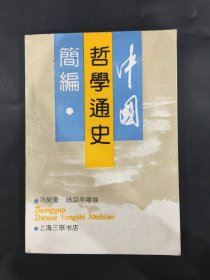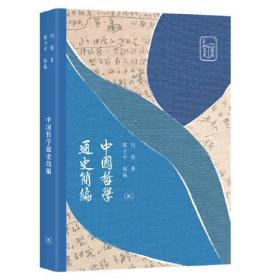
中国哲学通史简编
全新正版 极速发货
¥ 128.97 6.5折 ¥ 198 全新
库存100件
广东广州
认证卖家担保交易快速发货售后保障
作者冯契,陈卫平 著 童世骏 等 译
出版社生活·读书·新知三联书店
ISBN9787108078520
出版时间2024-06
装帧精装
开本16开
定价198元
货号1203362568
上书时间2024-11-24
- 最新上架
商品详情
- 品相描述:全新
- 商品描述
-
作者简介
作者冯契,陈卫平缩编。冯契,中国著名哲学家。中国哲学界素有南北二冯之说,北为冯友兰,南即为冯契。1941年毕业于清华大学哲学系1941—1944年为清华大学研究院研究生,受教于金岳霖、冯友兰、汤用彤等著名哲学家。自1944年起,先后在云南大学、同济大学、上海纺织工学院、复旦大学任教。自1952年起,一直在华东师范大学任教,先后担任过华东师范大学政治教育系副主任和主任,哲学系、哲学研究所名誉主任、名誉所长,上海社会科学院哲学研究所副所长和副院长。国务院学位委员会第一届学科评议组成员,上海市上海科学联合会副主席、中国史学会副会长、上海市哲学学会会长。
译者分别为童世骏 (上海纽约大学校长,挪威卑尔根大学获博士学位)、徐汝庄(华东师大哲学系副教授,担任《华东师大学报》哲社版论文题目和摘要英译20年)、Paul J. D’Ambrosio(美国人,华东师大哲学系副教授)、Ady Van den Stock(美国人,比利时根特大学语言文化系博士后)。
目录
Chapter 1 Introduction
1.1 The Methodology for the Study of the History of Philosophy
1.2 Characteristics of Traditional Chinese Philosophy
1.3 The Struggles Between "Past and Present" and Between "China and the West" and the Revolution in Modern Chinese Philosophy
References
Part Ⅰ The Pre-Qin Period(CA.1046-256 BCE)
Chapter 2 The Rise of Confucianism,Mohism,Daoism,and Legalism
2.1 Confucius Doctrine of the Unity of Humanity and Knowledge
2.2 Mozi and the Conflict Between Confucianism and Mohism—The Antagonism Between Empiricism and Apriorism
2.3 The Laozi:"The Movement of Dao Consists in Reversion"—The Presentation of the Dialectical Principle of Negation
2.4 Sunzi Bingfa(Sunzis Art of War)and the Rise of the Legalists
References
Chapter 3 The High Tide of Contention Among the "Hundred Schools of Thought"
3.1 The Guanzi:The Confluence of Legalism and Doctrines of the Huang-Lao School
3.2 The Conflict Between Confucian and Legalist Schools and Mencius Doctrine of the Goodness of Human Nature
3.3 Zhuangzi:"Where All Things Are Equal, How Can One Be Long and Another Short?"—Relativism Against Dogmatism
3.4 The Logicians Debates on "Hardness and Whiteness" and on "Similarity and Difference"—A Conflict Between Relativism and Absolutism
3.5 Later Mohist Views on the Relationship Between Names and Actualities and on Nature
References
Chapter 4 The Summing Up Stage of Pre-Qin Philosophy
4.1 Xunzis Summation of the Debates over "Heaven and Humankind" and over "Names and Actualities"—The Union of Naive Materialism and Naive Dialectics
4.2 Han Fei:"Incompatible Things Cannot Coexist"
4.3 The Yi Zhuan:"The Interaction of Yin and Yang Constitutes the Dao"—The Establishment of the Naive Principle of the Unity of Opposites
4.4 The Development of the Doctrine of the Yin Yang and Five Agents—The Application of the Comparative Method of Dialectical Logic to the Sciences
References
Part Ⅰ A Brief Summary
Part Ⅱ From the Qin Han to the Qing Dynasty
Chapter 5 The Supremacy of Confucianism and Criticisms of Confucian
Theology
5.1 Dong Zhongshu and the Huainanzi—The Antagonism Between the Teleological and Mechanistic Doctrines of Huo Shi
5.2 Wang Chongs Materialistic Doctrine of Mo Wei in Opposition to the Doctrine of Huo Shi
References
Chapter 6 Mysterious Learning and the Coexistence of Confucianism, Daoism, and Buddhism
6.1 Wang Bis Doctrine of "Valuing Non-being" and Pei Weis "On the Importance of Being"
6.2 Ji Kangs Challenge to Fatalism
6.3 The Commentary on the Zhuangzi:"When There Is Being, There Is Non-being"—The Doctrine of "Self-transformation" Against Metaphysical Ontology
6.4 Ge Hongs Daoist Philosophy and Seng Zhaos Buddhism Expounded in Terms of Mysterious Learning
6.5 Fan Zhens Summing Up of the Debate over Body and Soul—The Application of the Materialist Principle of the Unity of Substance and Function
References
Chapter 7 A Tendency Towards the Confluence of Confucianism, Daoism, and Buddhism
7.1 The Buddhist Tiantai Schools Doctrines:"The Three Levels of Truth Are in Perfect Harmony with One Another" and "Even Inanimate Things Possess the Buddha Nature"
7.2 The Buddhist Dharma Character Schools Doctrine:"Everything Is Consciousness Only" and the Buddhist Huayan Schools Doctrine:The Universal Causation of the Realm of Dharmas—The Antithesis between Idealistic Empiricism and Rationalism
7.3 The Buddhist Zen(Chan) School—The Completion of Confucianized Buddhism
7.4 Li Quans Religious Daoism with a Voluntarist Orientation
7.5 Liu Zongyuan and Liu Yuxi:"Heaven and Human Beings Do Not Interfere with Each Other" and "Heaven and Human Beings Are Evenly Matched":A Materialist Summary of the Debate Concerning "Effort and Fate"
References
Chapter 8 The Prevalence of Neo-Confucianism and the Criticisms
of Neo-Confucianism
8.1 Zhou Dunyi,Shao Yong,and the Cheng Brothers:Founders of Orthodox Neo-Confucianism
8.2 Zhang Zais Summing Up of the Debate over "Being and Non-being(Movement and Tranquility)"—An Exposition of the Principle of the Unity of Opposites in Terms of Qi Monism
8.3 Zhu Xis System of Principle Monism
8.4 The "Jing Gong New Learning" and the "Utilitarian Learning" as Opposed to the Chengs and Zhu Xis Doctrine of Principle
8.5 Wang Shourens System of Mind Monism
8.6 Li Zhis "Heretical" Thoughts
References
Chapter 9 The Summing Up Stage of Ancient Chinese Philosophy
9.1 Wang Fuzhis Summary of the Debate over "Principle and Vital Force(The Dao and Concrete Things)" and "Mind and Matter/Things(Knowledge and Action)"—A System of Qi Monism Unifying Naive Materialism and Naive Dialectics
9.2 The Enlightenment Thought and Historicist Methodology of Huang Zongxi
9.3 Gu Yanwus "Practical Learning of Cultivating Oneself and Governing Others"
9.4 Yan Yuans Discussion of "Practice" and Dai Zhens Discussion of "Knowledge"
References
Part Ⅱ A Brief Summary
Part Ⅲ Modern Period
Chapter 10 The Forerunners of Modern Chinese Philosophy
10.1 Gong Zizhen:"The Dominator of the Masses Is Called the ‘Self"—The Beginning of Modern Humanism
10.2 Wei Yuan:"Basing My Ideas on Things" and "Knowing Something after Being Involved in Something"—The Beginning of the Debate over the Relation Between Mind and Matter/Things(Knowledge and Action) in Modern Times
References
Chapter 11 The Stage of Evolutionism in the Philosophical Revolution
11.1 Kang Youwei:An Advocate of Historical Evolutionism
11.2 Tan Sitong:The "Study of Humanity" Aimed at Breaking the Chains of Bondage
11.3 Yan Fus "Doctrine of Natural Evolution" and Empiricism
11.4 Liang Qichao on the Freedom of the "Self" and the Evolution of the "Group"
11.5 Zhang Taiyan:"Competition Produces Intelligence and Revolution Develops Peoples Knowledge"—A Rudimentary Version of the Viewpoint of Social Practice
11.6 Wang Guowei:The Believability Versus the Lovability of Philosophical Theories
11.7 Sun Yat Sens Evolutionism and His Doctrine of the Relation Between Knowledge and Action
References
Chapter 12 The Philosophical Revolution Enters the Stage of Materialist Dialectics
12.1 Li Dazhao and Chen Duxiu:From Evolutionism to Historical Materialism
12.2 Hu Shis "Experimentalism" and Liang Shumings Intuitionism
12.3 The Debate over Science Versus Metaphysics and Qu Qiubais Historical Determinism
12.4 Lu Xun on National Characteristics and His Aesthetic Ideas
References
Chapter 13 The Sinicization of Marxism and the Contributions Made by Professional Philosophers
13.1 Li Da and Ai Siqi:First Attempts to Sinicize Marxist Philosophy
13.2 Xiong Shili:New Doctrine of Consciousness Only
13.3 Zhu Guangqian:An Aesthetic Theory of Expression
13.4 Jin Yuelin:"Applying What Is Attained from Experience to Experience—Realism Based Unity of Perceptual and Rational Knowledge,and of Facts and Principles"
13.5 Feng Youlan:"The New Rational Philosophy"
13.6 Marxists Critical Investigations on Traditional Thought
13.7 Mao Zedong:The Dynamic and Revolutionary Theory of Knowledge as the Reflection of Reality—A Summation of the Debate over the Relation Between "Mind and Matter/Things" in the Philosophy of History and Epistemology
References
Part Ⅲ A Brief Summary
Postscript
Glossary of Chinese Characters
Index
内容摘要
本书是冯契“哲学史两种”(《中国古代哲学的逻辑发展》《中国近代哲学的革命进程》)的简缩本《中国哲学通史简编》的英译本,是一部贯通上古至1949年为止的完整的“中国哲学通史”。全书围绕“天人、名实”之辩、“理气(道器)”之辩、“心物(知行)”之辩等重要命题展现中国哲学的演化脉络。冯契在书中提出了自己关于哲学史的定义:哲学史是“根源于人类社会实践主要围绕着思维和存在关系问题而展开的认识的辩证运动”。本书从广义认识论的角度突显了中国传统哲学的特点:在逻辑学上,中国传统哲学擅长辩证逻辑,而在自然观上,则发展了气一元论,这与西方人发展形式逻辑和原子论颇为不同;在伦理学上,中国传统哲学注重自觉原则,而在美学上则较早提出了言志说和意境理论,这和西方人高扬自愿原则和较早提出模仿说及典型性格理论也是旨趣不同的。本书也对中国近代哲学(1840—1949)做了开拓性的研究,指出中国近代哲学革命在“古今中西”之争的制约下,围绕历史观、认识论、逻辑和方法论问题以及人的自由和理想问题等四个方面展开,既受到西方近现代哲学的影响,又是中国传统哲学的“理气(道器)”之辩、“心物(知行)”之辩、“名实”之辩、“天人”之辩在近代的发展。中国近代哲学在历史观和认识论上取得了标志性的成就,即马克思主义中国化的“能动的革命的反映论”。但在逻辑学和方法论上及人的自由和理想问题上,中国近代哲学未能做出系统总结。本书同时论述了当代中国对于近代哲学革命如何“接着讲”的问题。
主编推荐
冯契先生是当代中国为数不多的有着自己理论体系的哲学家之一,他没有留下任何遗言,却留下了数百万字的哲学著作,这些丰富的学术遗产,融合了中国传统哲学、西方哲学和马克思主义哲学,是当代中国哲学的瑰宝。
相关推荐
— 没有更多了 —





















以下为对购买帮助不大的评价